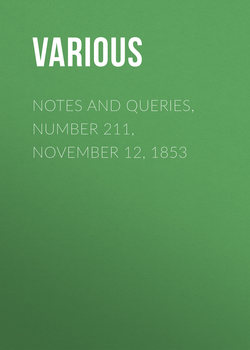Читать книгу Notes and Queries, Number 211, November 12, 1853 - Various - Страница 5
Notes
PARALLEL PASSAGES
Оглавление(Vol. iv., p. 435.; Vol. vi., p. 123.; Vol. vii., p. 151.)
1. "When she had passed it seemed like the ceasing of exquisite music."—Longfellow's Evangeline, Part i. I.
"When she comes into the room, it is like a beautiful air of Mozart breaking upon you."—Thackeray "On a good-looking young Lady." (Quoted in Westminster Review, April 1853.)
2. "Two stars keep not their motion in one sphere."—Whence?
"We are the twin stars, and cannot shine in one sphere. When he rises I must set."—Congreve, Love for Love, Act III. Sc. 4.
3. "Et ce n'est pas toujours par valeur et par chasteté que les hommes sont vaillants et que les femmes sont chastes."—De La Rochefoucauld, Max. I.
"Yes, faith! I believe some women are virtuous, too; but 'tis as I believe some men are valiant, through fear."—Congreve, Love for Love, Act III. Sc. 14.
4. "Mais si les vaisseaux sillonnent un moment les ondes, la vague vient effacer aussitôt cette légère marque de servitude, et la mer reparait telle qu'elle fut au premier jour de la Création."—Corinne, b. I. ch. 4.
"Such as Creation's dawn beheld, thou rollest now!"—Byron, Childe Harold.
5. "Il est plus honteux de se méfier de ses amis que d'en être trompé."—De La Rochefoucauld, Max. LXXXIV.
"Better trust all, and be deceived,
And weep that trust, and that deceiving,
Than doubt one heart that, if believed,
Had blessed thy life with true believing!
"Oh! in this mocking world, too fast
The doubting fiend o'ertakes our youth:
Better be cheated to the last,
Than lose the blessed hope of truth!"
—Mrs. Butler (Fanny Kemble).
6. In "N. & Q.," Vol. iv., p. 435., I cited, as a parallel to Shelley, the following from Southey's Doctor, vol. vi. p. 158.:
"The sense of flying in our sleep might, he thought, probably be the anticipation or forefeeling of an unevolved power, like an Aurelia's dream of butterfly motion."
In Spicer's Sights and Sounds (1853), p. 140., is to be found a poem professing to have been "dictated by the spirit of Robert Southey," on March 25, 1851, the fourth stanza of which runs as follows:
"The soul, like some sweet flower-bud yet unblown,
Lay tranced in beauty in its silent cell:
The spirit slept, but dreamed of worlds unknown,
As dreams the chrysalis within its shell,
Ere summer breathes its spell."
What inference should be drawn from this coincidence for or against the reality of the "spiritual dictation?"
Harry Leroy Temple.
